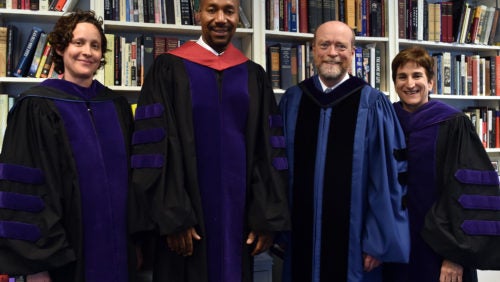Professor Paul Butler Installed as the Albert Brick Professor of Law
April 17, 2017

Professor Paul Butler, the inaugural Albert Brick Professor of Law, with Professor Allegra McLeod, Dean William M. Treanor and Professor Abbe Smith.
“My name is Paul Butler and I represent the United States — that’s how I used to start my opening statements when I was a prosecutor,” Professor Paul Butler said to the crowd gathered in Hart Auditorium on April 12. “I represented the government in criminal court in the District of Columbia, and I used that power to put black men in prison. And black women. And poor people. And Latinos. Like a lot of prosecutors that was pretty much all I did.”
No longer. Butler is now the inaugural Albert Brick Professor of Law at Georgetown — where he uses his power to explore attitudes about race. His address, “Black Resistance: Law and the Forging of a Race,” gave a tantalizing preview of his upcoming book Chokehold: Policing Black Men (The New Press, July 2017).
“A spirit of resistance is one of the defining characteristics of black people in the United States…” Butler said, asserting that a defining characteristic of being black in this country is fighting back. “It is black culture that has allowed African Americans to survive in a hostile land. Black resistance is an epistemology of self-respect, against all odds.”
Resistance is “resistance to law — not the concept of it, but the practice of the United States…” Butler said, noting that even relatively recent Supreme Court decisions have harmed black people by giving police superpowers. “My work has focused on black resistance to the criminal process, to the police and to punishment.”
How to resist? Violence has sometimes been effective, though Butler discourages it on moral grounds. Financial success (because money is power) is a frequently discussed response. Yet in the end, Butler’s vision includes prison abolition.
“To many older folks, prison abolition sounds reckless and unsafe…but only 20 percent of people in prison are there for a homicide or a sex crime…” he says. “The idea is to come up with other ways of keeping communities safe, and holding people who cause harm responsible, without locking those people in cages for many years…abolition doesn’t mean opening all of the prison doors tomorrow.”
A Leading Voice
Professor Allegra McLeod, the leading legal theorist on prison abolition, called Butler’s scholarship “singularly creative, brilliant and risky.”
“As he’s engaged the work of James Baldwin, Malcolm X, Gwendolyn Brooks and Toni Morrison, he’s reoriented both legal scholarship and public understandings of race, crime and punishment…” McLeod said. “One feels in Paul’s writing a passionate urgency, an intimacy and a formidable critical edge that distinguishes Paul as perhaps the most important critical race theorist writing today.”
Professor Abbe Smith called Butler “a gifted teacher, scholar activist, and all-around national treasure.” She played clips of Butler’s notable appearances in the national media, including a “60 Minutes” interview from the 1990s on race-based jury nullification and a 2015 visit to “The Diane Rehm Show.” (When a caller implied that the act of displaying the Confederate flag honored her Southern ancestors, Butler famously responded, “I have no respect for your ancestors. As far as your ancestors were concerned, I shouldn’t be a law professor at Georgetown. I should be a slave.”)
Dean William M. Treanor said it has been a privilege to watch Butler influence American law — “as a brilliant scholar, as an extraordinary teacher, as a remarkable member of this community…and as a leading voice who inspires us and teaches us, with his profound commitment to justice.”
The Albert Brick Professorship resulted from a remarkable agreement between two brothers — one a Georgetown Law alum of 1934, one a Medical Center professor — to endow faculty positions at their schools in each other’s honor.